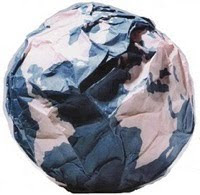File this one under ironic...

This is absolutely hilarious, the direct marketer's are installing recycling bins to save money and yet they send out millions of pounds of junk mail a year to American homes... when will the insanity end?
Direct Marketer’s Recycle Bins Save $500,000 Per Year

Direct mail and marketing firm PEP-Direct says it will save approximately $500,000 a year working with International Paper Products Corp. to reduce the amount of waste it sends to landfills and reduce the cost of waste removal, DM News reports.
IPP is providing signage and receptacles for PEP’s non-recyclable materials such as label stock and packaging. The companies have been working together for about a month.
IPP empties the recycle bins once or twice a week (the company will travel up to 100 miles from its Westfield, MA plant) and then compacts the waste into Enviro-Fuelcubes, which are burned in place of fossil fuels. PEP is using the arrangement to promote a greener image.
.jpg)








